Lavender Farm Supports Organization Battling Sex Trafficking Beautiful Business Blooms
Published July 11th, 2023 at 9:36 AM
Above image credit: Joe Steineger was a farmer early in his career, and is happy to return to the trade in his retirement. (Cami Koons | Flatland)“Joe never gives up on a plant,” Jenny Steineger said as her husband parted a seemingly dead lavender bush to reveal new growth at its core.
An unseasonably early winter cold snap resulted in a rather puny harvest for the Steinegers at Lavender Hill Farm in Kansas City, Kansas.
“That’s farming,” she said with a shrug.
It’s a bit of a blessing in disguise. The couple is still selling part of their large harvest from last year and hardly have room to store more.
Plus, it’s never really been about the business, or making a profit.
The real mission of the aromatic farm is to support and bring awareness to Veronica’s Voice, a local nonprofit assisting women who have survived sex trafficking.
Joe and Jenny Steineger bring awareness to the organization, and its mission, as they talk to folks at the City Market Farmers Market, where they sell lavender bunches, candles, creams and their most popular product, lavender hydrosol.
The farm is also open to women in the program. They help harvest the lavender and make some of the products. They also benefit from learning soft skills and the grounding experience of farming.
“To me, that’s the value of this place — way more than any of the money we will ever make,” Joe Steineger said.
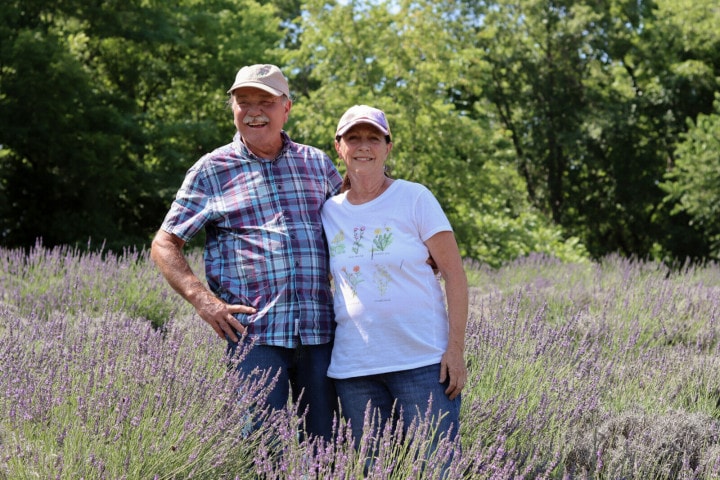
Budding Friendship
Kristy Childs started Veronica’s Voice in 2000 as a hotline for victims of sexual exploitation and commercial trafficking. It has since grown into a nonprofit that helps to rehabilitate survivors and advocate for policy changes and education around sexual exploitation.
Childs is a survivor. She was trafficked across the U.S. starting at the age of 12. In Kansas City, she met and befriended a similar soul, Veronica Neverdusky, who was later murdered in 1993. Veronica became the namesake for Childs’ organization, though Childs said her story is not uncommon among survivors.
“There are so many women throughout history that have been misunderstood, mislabeled … because they’re just seen as trash and as people that don’t count,” Childs said. “And they do count.
“When I found my way out, I wanted other girls and women to be able to find their way.”
Today, Veronica’s Voice offers several services, the most intensive of which provides survivors with two years of transitional housing and a phased rehabilitation program. By the end of two years, women have been through emotional and physical rehabilitation, learned soft skills and built up enough financial backing to launch into a new life.
This approach differs from most no-cost rehab programs, which spit people out after about a month.
“That was always amazing to me that we would pay for these 28-days-drug treatment, and think these people were going to be prepared for life,” Childs said.
Jenny Steineger became friends with Childs and got involved volunteering with Veronica’s Voice in 2016.
“When I got involved, I selfishly thought … I could bring a lot to the table,” Jenny Steineger said. “Shoot, they’ve taught me a lot more than I ever taught them.”
Steineger and Childs ended up at a lavender festival one year and decided a farm could be an element of the program. The pair laughed as they recalled the memory.
“(Joe) came home from work one day and I said, ‘Joe, could we have a lavender farm?’” Jenny Steineger recalled. “Joe, after you know him, you’re not surprised to hear him say, ‘Well, I think we can. We don’t know what we’re doing, but okay.’”
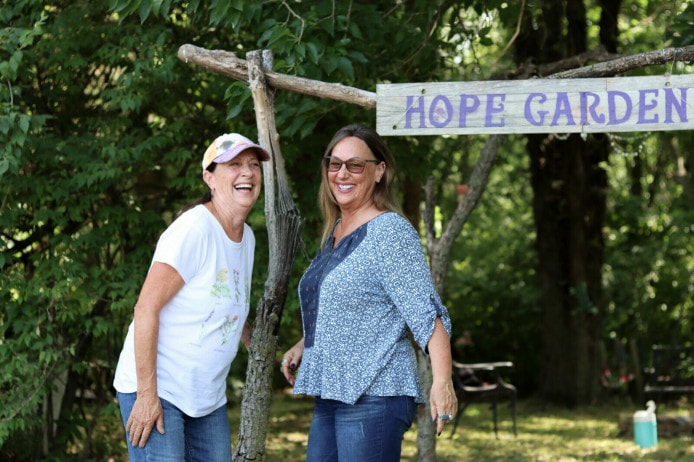
They had bought the KCK lot, now home to the lavender farm, years prior and never knew what purpose it would serve. In 2019, they planted 1,000 lavender plants on the hill and had a crop to harvest just two years later. (It normally takes three years for the plant to mature.)
The next year they almost lost the crop due to heavy rains during harvest season, but they managed to save most of it.
“The good Lord since day one has shined a big light on this place, and I think it’s because of their connection,” Joe Steineger said, and gestured to his wife and Childs.
Healing in the Dirt
The Steinegers have many stories that speak to the power of working out on the farm.
“Once you get your feet out in that dirt … it kind of becomes between you and God and creation, and you feel a part of that,” Joe Steineger said. “You’re a piece of that puzzle.”
Sometimes folks who struggle with addiction feel like “a square when there’s a round hole” he said. The plants and the dirt don’t make those constraints.
He recalled memories of women from Veronica’s Voice remarking that they’d “never felt such honest love” as they felt on the farm.
“I think the best example of someone being healed by this farm is our son,” Jenny Steineger said as she gestured to her son, Ben, who sat beside her.
In 2019, when the Steinegers first planted the lavender, Ben had checked into Welcome House, a long-term recovery center in Kansas City, for the third time.
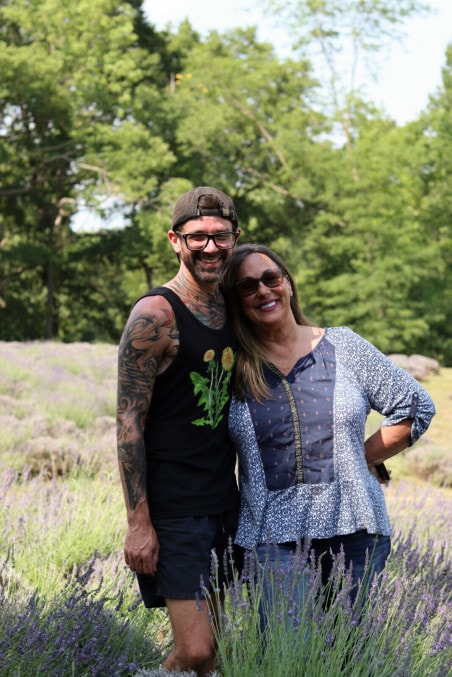
Frequently, he would come out to work on the farm with his parents.
“I don’t know what it was about being in the dirt and being in the ground and laughing with my parents and planting things and watching them grow,” Ben Steineger said. “It made me slow down, and I could kind of forget about everything else that was going back on at the house.”
At the house, it was emotional work, following steps, attending meetings. At the farm, it was simpler.
“It was huge for me. It completely changed the direction I thought my life was going,” Ben Steineger said.
Now, he’s more than four years sober and studying herbalism while working alongside his parents at the farm.
“It’s a miracle,” Jenny Steineger said with a loving smile.
Ben Steineger said he’s seen folks from the Welcome House and from Veronica’s Voice have similar experiences when they visit and work on the farm.
“It’s deeply healing,” he said.
Changing the Focus
The work doesn’t stop at healing individuals.
Childs has pushed, and continues to push, to change the focus around sex trafficking and sex work.
“The focus needs to be on the buyers of these vulnerable people,” Childs said.
Rather than punish women or men for prostitution, Childs advocates for corrective action towards those who buy services.
“As an adult, and when I was a child, the word ‘trafficking’ wasn’t even a thing,” Childs explained. “I was a prostitute. I was the criminal.”
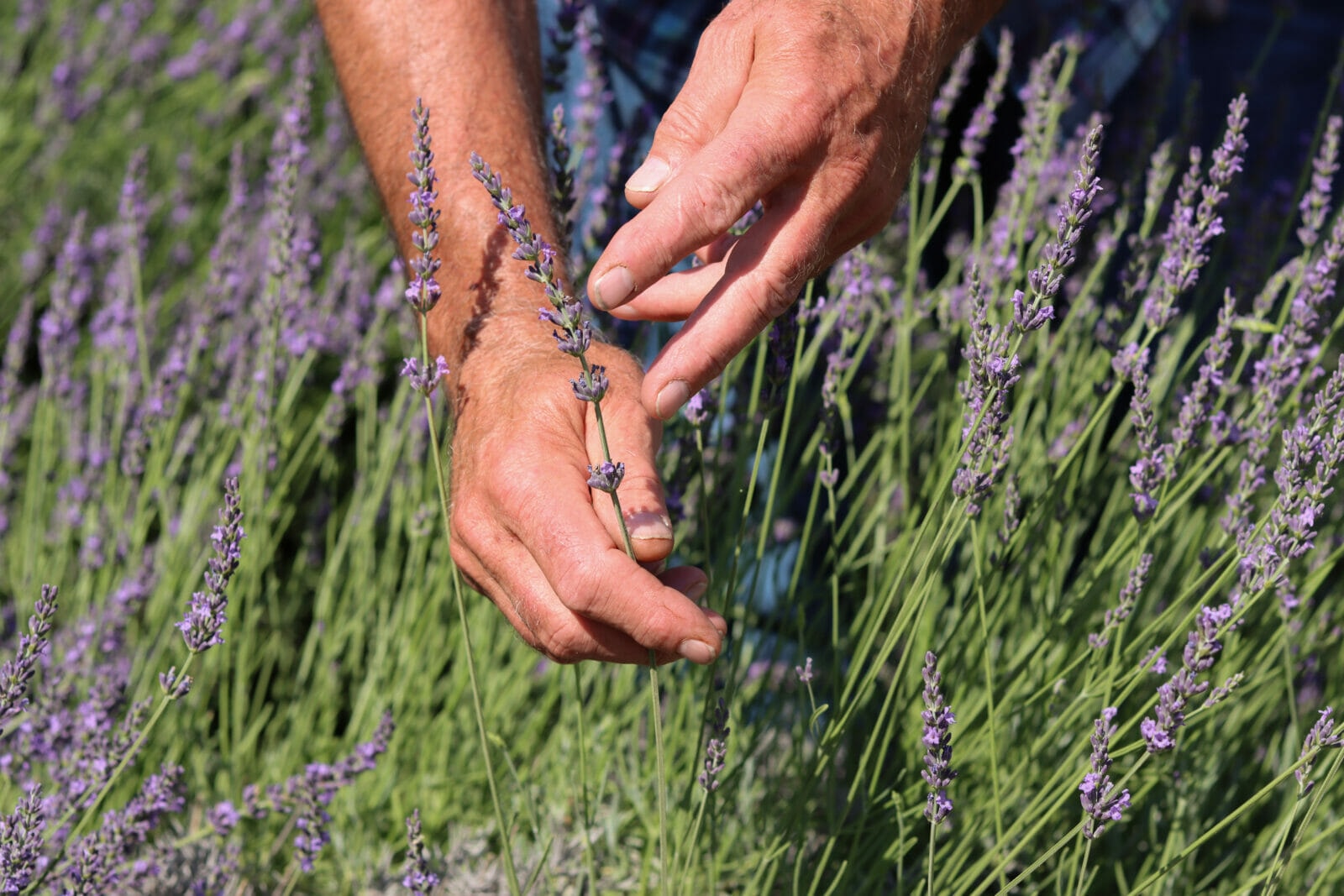
Public knowledge around the topic has evolved somewhat over the years. Even so, women are still targeted and charged as criminals.
Until the last decade, Kansas had a steeper punishment towards prostitution than it did towards patronizing (buying) prostitution. Today, the statute criminalizes buying sexual acts as a class A misdemeanor. Selling is a class B misdemeanor.
A study published by the U.S. Department of Justice cites a 1999 Swedish law that decriminalized the sale of sexual acts and instead criminalized the purchase of them. It reduced street prostitution by 50%-70%.
“The need for people to provide a ‘supply’ and for pimps and traffickers to ‘distribute’ the supply to buyers would not exist without demand,” the report concludes. “The historic emphasis on interfering with supply and distribution systems has been ineffective at producing substantial and lasting reductions in illegal commercial sex markets.”
A continued focus on those selling perpetuates the cycle.
“I identified as a prostitute, because that’s what I was told that I was,” Childs said. “I broke that and understood that’s not who I am – that’s what I had to do. That’s where my life was.”
In Childs’ experience, no one chooses to be sexually exploited. Money encourages coercion.
“The money shows coercion,” Childs said. “You could ask any woman, girl, boy, ‘Would you have done that, without the money?’ They would say, ‘No, I would not have.’”
That means anyone buying, or turning a blind eye, is also at fault.
“I think the majority of men, if they do learn about the trafficking, figure, ‘Well, if I’m not a part of it, that’s good enough,’” Joe Steineger said. “Well, it ain’t good enough. You need to be vocal — you need to stand up.”
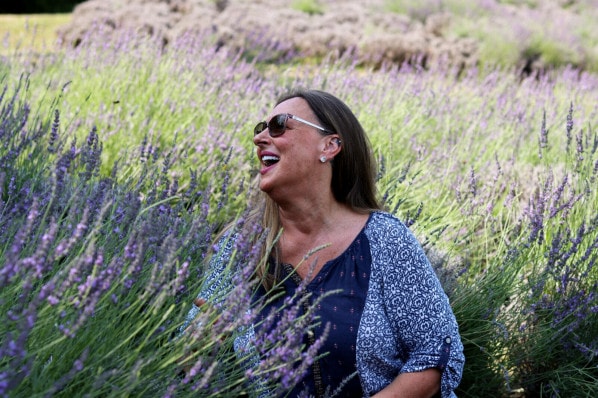
In 2018 Childs advocated for and succeeded in mandating a course about human trafficking for truck drivers in Kansas.
“It doesn’t mean they still won’t do it,” Childs said. “But now they’re knowledgeable. Once you know something you can’t un-know it.”
In 2021 alone, the National Human Trafficking Hotline received more than 50,000 messages. The majority of identified situations were for sex trafficking.
“I think people need to recognize it doesn’t matter how they got there — they’re there,” Childs said. “If they want help to not have to do that — no one should have to compromise themselves sexually for survival purposes.”
It’s a big issue, something Childs can’t fix on her own. Now, she’s turned most of her efforts to expanding the recovery house, which currently has a capacity of just five women.
“It may only (serve) five women, but it’s like that starfish story,” Childs said. “I help them because this is too big. It’s too big, and there’s too much power that is against making it change.”
Folks who want to support Veronica’s Voice can volunteer, donate at its website and shop Lavender Hill Farm at the City Market Farmers Market or online.
Cami Koons covers rural affairs for Kansas City PBS in cooperation with Report for America. The work of our Report for America corps members is made possible, in part, through the generous support of the Ewing Marion Kauffman Foundation.


